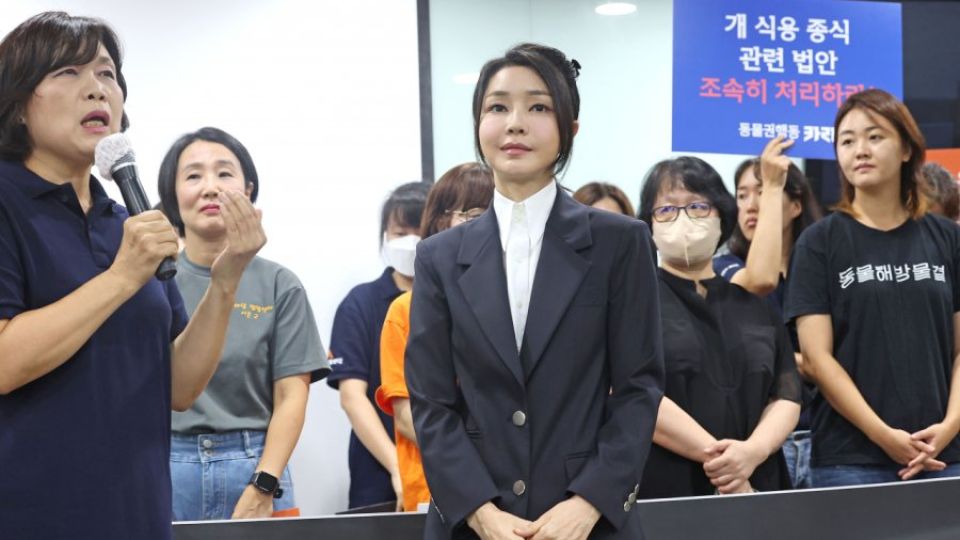August 31, 2023
SEOUL – First lady Kim Keon Hee said she would work with animal activists until the dog meat industry was eradicated in Korea, continuing her campaign to promote awareness of animal rights.
“We all know how we came forward today with a heart filled with sadness and urgency. Here, all of you are giving everything to save these small lives, but there are animals out there dying so cruelly and unbearably that it’s truly hard to watch,” she said as she appeared at a press conference held by local animal rights activists on Wednesday.
“I will become friends with these individuals and work tirelessly until the consumption of dog meat is banned. I promise,” she said.
Since her husband, President Yoon Suk Yeol took office last year, Kim has been active in environmental, animal welfare and social advocacy initiatives. She also previously expressed her intent to end the consumption of dog meat during Yoon’s tenure.
She has raised the issue at a series of official settings, such as her solo engagements with French Foreign Minister Catherine Colonna in April and renowned primatologist Jane Goodall, in July, where she addressed her concerns over the brutal abuses inflicted in the dog meat trade.
With the first lady remaining vocal over the issue, bipartisan lawmakers last week convened to establish a group focused on ending dog meat consumption, with some calling the potential bill the Kim Keon Hee Act.
Forty-four lawmakers from the ruling and opposition parties attended the meeting. Historically, discussions on strengthening animal rights have primarily been championed by liberal parties. Many believe Kim’s involvement may help address the longstanding challenge of banning dog consumption.
Rep. Park Dae-chul of the conservative People Power Party posted on his Facebook account, “The green light has turned on for the ‘Kim Keon Hee Act,'” referencing the bipartisan lawmakers’ meeting.
Korea is the only country that farms dogs for consumption. Many Asian nations, including Hong Kong, Taiwan, the Philippines, Thailand and Singapore, have either banned dog consumption or are actively pursuing legislation to do so.
Kim, a former entrepreneur in the cultural field, has been active in raising social issues.
On Monday, she visited a local police station to encourage police officers handling suicide in Seoul.
Citing the high suicide rate, especially among women in South Korea, Kim said that the overwhelming majority of suicides in Korea were linked to social pressure.
“To create a healthy society, we need to think about and support (those who need help) in various ways,” she told officers, according to a written statement from presidential spokesperson Lee Do-woon.
She also noted the rising number of suicides among the younger generation, saying, “Young people should not be making this loneliest of choices.”
According to Statistics Korea, when comparing suicide rates among member nations of the Organization for Economic Cooperation and Development, Korea’s suicide rate was the highest at 24.1 per 100,000 people in 2022. Since 2003, Korea has relinquished the top spot to Lithuania only in 2016 and 2017.
Korea’s average suicide rate is more than double the OECD average of 11.1.
Kim heard firsthand accounts from the officials, including about the rescue of someone who had attempted suicide, saving family members and teens from suicide attempts and instances of injuries sustained during rescues.
“You are saving the lives of those attempting suicide and helping them find a place in society,” Kim told the officials. “Your dedication is commendable.”
She also listened to suggestions from on-site officers, including expanding surveillance camera coverage along the Han River, ensuring emergency beds are available post-rescue and providing professional counseling.
—
If you’re thinking about self-harm or suicide, contact the Ministry of Health and Welfare’s helpline 1393, available 24 hours a day, 7 days a week. Please request a translator for English-language services.


